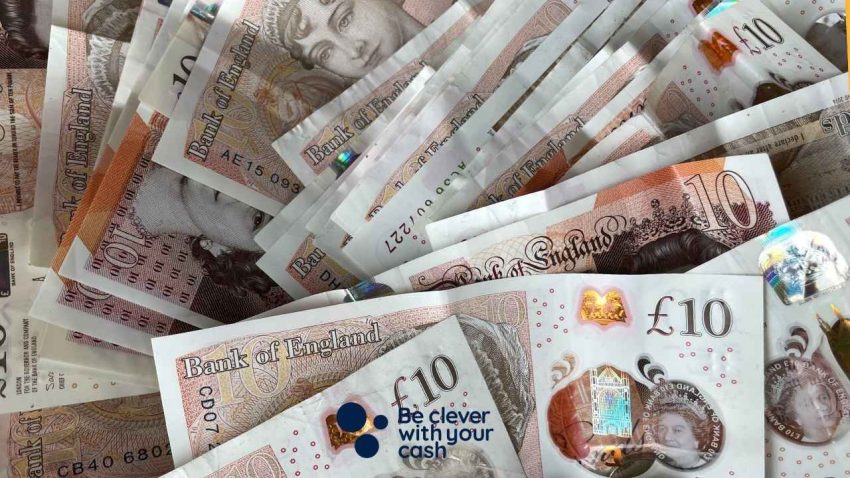How your money is protected if a bank goes bust.
Whenever there’s news of a bank in trouble, even if they’re not on the UK high street, it understandably makes people worry about what would happen to their cash in the event their bank was to fail.
Well, the good news is there are protections available that will mean you don’t lose your money. Here’s how to make sure you benefit.
Some articles on the site contain affiliate links, which provide a small commission to help fund our work. However, they won’t affect the price you pay or our editorial independence. Read more here.
What is the FSCS?
The Financial Services Compensation Scheme, aka the FSCS, is an industry-funded scheme that covers a number of products, from insurance and mortgages through to funeral plans and investments. But where most people will encounter it is via their savings accounts.
Under the FSCS, your money held in banks, building societies and credit unions – as long as they are authorised to operate in the UK – is covered up to set limits in the event the bank goes bust.
If the worst was to happen you’d not need to do anything, with the money automatically refunded to you within two or three days in most cases.
How much is covered?
From 1 December 2025, you’ll be compensated up to £120,000 per financial institution, or doubled to £240,000 for joint accounts. This is increased from the previous £85,000 and £170,000 respectively.
Even at the old level, it’s going to be more than enough for the vast majority of people. But if you do have more cash, either temporarily or for long periods, you can still ensure your money is covered by FSCS protection.
For temporary high balances
There are may be times when you have a lot of money suddenly come into your account. That could be you sell a property but don’t buy another straight away, you inherit some money or perhaps take a tax-free cut of your pension on retirement.
In instances like this, you’ll get cover up to £1.4 million for six months, increased in December 2025 from the previous £1 million limit. That’ll give you plenty of time to redistribute the funds across multiple accounts, or use it on things like investments or your mortgage.
However, not every life event will count towards this. You can see a broader list on the FSCS website. It’ll also take longer to get the balances over £120,000 back as you’ll need to submit evidence that it meets the criteria for a temporary balance.
For ongoing savings above £120,000
Next up you’ll notice the limit is per instituion. Not per account or per person. In most cases this means per bank. So if you have more money you can just hold anything over £120,000 in one or more different banks. Sorted.
However, there are a handful of times when institution actually includes more than one bank or building society. This is when a bank has more than one brand, or perhaps where a few different places have merged.
In these instances you need to be careful not to exceed the £120,000 across those banks when the value of your savings is combined. Here are the ones you’re most likely to have encountered:
- Bank of Ireland, Post Office, AA Financial Services
- Co-operative Bank, Smile, Britannia (but not Coventry Building Society)
- Halifax, Bank of Scotland, Intelligent Finance, Birmingham Midshires
- HSBC, First Direct
- Marcus, Saga
- Santander, Cahoot
- Virgin Money, Clydesdale and Yorkshire Bank (but not Nationwide)
 Featured switching deal
Featured switching deal
 Customer rating
3.8/5
Customer rating
3.8/5
- Switch bonus£200
- Offer endsFree gift card ends 27 February
- Extra bonus£25 Amazon Gift Card
- FSCS Protected? Yes
- Switch bonus requirements Switch using the Current Account Switch Service and close your old account within 60 days of starting the switch
- Deposit requirements Deposit £1,500 in the first 60 days from opening the account
- Direct debits transferred over Set up two Direct Debits before or after the switch from a selected list of household bills
- Existing customers? Can't have held any Santander current account on 1 January 2025
- Restrictions Can't have received a switching bonus from Santander already, offer limited to once per person
- Eligible accounts Open a new or hold an existing Everyday, Edge, Edge Up or Edge Explorer current account
- £25 Amazon Gift Card requirements To qualify for the gift card, you need to complete a full switch using CASS, and make five debit card transactions within 30 days of opening the account. Offer ends 3pm 27 February 2026
Get the best of our money saving content every week, straight to your inbox
Plus, new Quidco customers get a high paying £18 welcome offer

Who isn’t part of the FSCS
Just because a bank is operating in the UK it doesn’t mean it’s covered by FSCS, which is why it’s important to check whether a bank has a full UK licence on the FSCS website. You can also see when that licence is shared.
There will be some big names that aren’t included, such as digital banks Revolut and Monese, budgeting apps like HyperJar and savings apps like Plum and Chip.
That’s not to say your money held with these and similar companies doesn’t have any protection. Some will actually offer accounts via a licenced third party, such as Chip using ClearBank on its popular Instant Access account. So there’s nothing to worry about – unless of course you also hold more money with ClearBank direct or via another third party and the total takes you above £120,000.
Others might operate as e-money accounts. They’ll still hold your money in a licenced bank, but as a “trust account”. In these cases, as long as the underlying bank is part of the FSCS you’ll still get your money back, it’ll just take longer – perhaps up to three months.
Also excluded are payment services like PayPal or prepaid cards. You’ll also not be covered for any cash held in things like cashback accounts or Christmas saver schemes. So be extra careful to not hold too much in those types of places.
Should you have £120,000 in savings anyway?
Though it’s great to know this protection is in place, and that it can be extended by holding money across multiple banks, for most people I’d hestitate to keep so much money in cash unless there’s a specific thing you’re saving up for, such as a deposit on property or you’ve perhaps moved pension money to cash for stability later in life.
Even though interest rates have been improving massively in recent months, the accepted advice is that it’ll work better for you in the long term elsewhere.
Perhaps that’s in your pension (where you get tax relief on top), overpaying your mortgage or investing in stocks and shares (ideally in an ISA).
Broadly if you have enough in cash to cover core costs if you couldn’t work for three to six months (potentially more if that makes you feel more comfortable), along with enough for any expected big expenses, you probably don’t need it in cash.
And besides, if you do have this much money in non-ISA bank accounts, you’ll easily be surpassing your tax-free personal savings allowance, so getting a poorer return than you expect.
Alternatives to the FSCS
There is another way to protect your cash – potentially up to a couple of million pounds – and that’s via National Savings & Investments (NS&I). Any money held in their accounts, whether easy access, fixed or Premium Bonds, is covered by the government for the full balance.






I not anywhere near the FSCS limit. But when I think about whether my savings are safe, it’s about whether they’re safe from fraud rather than the bank going bust. I feel some banks have better security systems than others but I don’t really see anyone comparing them…
Mal I agree
When the Icesave bank collapsed in 2008 I was confident of re compense as it was covered by the FSCS, and I got every penny back (about 30k if I remember correctly) in a short period of time, although it was more than three days.
The alternative for the UK would have been a panick stricken run on every bank in the land and they weren’t going to allow that to happen.
This is something very basic but loads still don’t understand…
Even if your bank does go bust,, your savings under £85K are secure!
You have not commented on having an ISA above £85k with one bank, what do you suggest should be done in that circumstance.
It’s the same, so transfer balances above £85,000 to a different ISA
You need to be very careful about advising people to put the bulk of their money in stocks and shares. It’s more problematic than you suggest. Cash is a defensive asset for investors and currently much more effective than bonds. Equities are very volatile at the moment and could well flatliine for years. Also who is your advice aimed at? Different age groups will have different approaches.